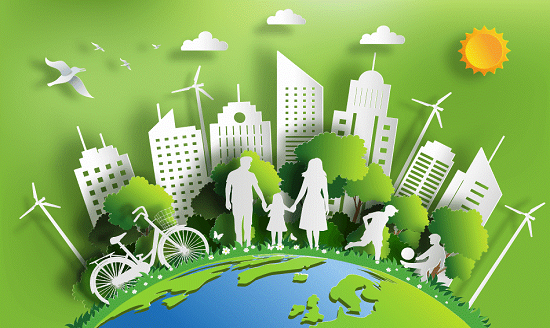Vitality for the circular economy
The Central Institute for Economic Management Research's director, Dr. Tran Thi Hong Minh, feels that aggressively fostering the circular economy in tandem with regional interconnections is crucial for achieving a swift breakthrough for environmentally friendly and sustainable economic growth.
The Politburo calls for attention to the creation and completion of legal policies on new economic development models, including the circular economy, in Resolution 41-NQ/TW on building and promoting the role of Vietnamese entrepreneurs in the new era. This will increase the development space available to entrepreneurs and businesses.

Synergizing Strengths
The Central Institute for Economic Management Research (CIEM) has proactively advised on proposals and policies to expand economic space through new economic models, given the backdrop of an economy facing numerous obstacles and challenges in the process of recovery and socio-economic development following the COVID-19 pandemic, as well as the need to expeditiously promote green transformation. This area is linked to the faster, more substantive, and more efficient use of "non-traditional" resources like time and data, as well as the creation of circular activities, innovative production organization concepts, and regional links.
"It is important to remember that any new economic model should be evaluated interactively and supportively rather than in isolation. As a result, prompt, coordinated, and comprehensive policy responses are needed to encourage economic entities to engage in sustainable development and generate additional value", said Dr. Tran Thi Hong Minh.
From this angle, CIEM stressed the idea of incorporating circular economy development into policies and regional linkage projects when advising the Ministry of Planning and Investment to submit to the Prime Minister the issuance of Decision No. 687/QĐ-TTg on June 7, 2022, approving the Circular Economy Development Scheme. Regional connections are known to assist communities in addressing problems that they are unable to solve on their own or in an ineffective manner, such as climate change adaptation. As a result, the circular economy mentality associated with regional connections fosters new partnerships and reciprocal advantages for communities involved in circular economy initiatives.
In Dr. Tran Thi Hong Minh's view, regional connections, on the other hand, provide enough market size or input scale for the manufacturing of recyclable trash and byproducts, making circular economy initiatives more viable and lucrative. In reality, a lot of circular economy initiatives in cities and provinces are becoming more closely connected to regional networks, which aids in resolving conflicts between communities in the area about social issues, infrastructure development, environmental resource management, and attracting investment.
Key to Growth
The advancements made in creating a circular economy with connections to other regions, according to Dr. Tran Thi Hong Minh, are only the beginning. Vietnam still needs to keep improving laws pertaining to industrial parks, economic zones, land, human resource development, green credit, green bonds, and other topics. This is true even after attempts to create policy frameworks, revise, and add to legal documents governing the circular economy and its related content.
CIEM, which is in charge of Decision No. 687/QĐ-TTg, has been conferring with organizations, specialists, and the business sector both locally and globally about the draft Government Decree that outlines the process for evaluating the development of a circular economy. Agriculture, forestry, fishing, industry, energy, and construction materials are among the suggested testing domains. Even at the regional level, these industries offer lots of room to express creativity and entrepreneurial spirit when coming up with and carrying out circular economy ideas.
In addition, Vietnam's institution for fostering regional ties is being refined. Coordinating Councils for each of the six socioeconomic areas will have been formed and merged by the end of 2023. There is a great chance to encourage regional connections as these Coordinating Councils function more thoroughly and productively, particularly through initiatives and models related to the circular economy. This potential, nevertheless, will only materialize if the municipalities in the area recognize their unique assets and actively pursue them in collaboration with one another, rather than being afraid of differentiation. Here, it is crucial to realize and put into practice the circular economy development testing mechanism as soon as possible in order to encourage communities to collaborate, exchange experiences, and create appropriate initiatives at the regional level.








